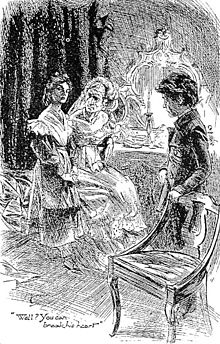Title: A Gift from Saint Nicholas
A New York Christmas Story
Author: S. E. Schlosser
Claas Schlaschenschlinger was a wealthy cobbler living on New Street in New Amsterdam. He was a contented bachelor who could afford eight - eight mind you! - pairs of breeches and he had a little side business selling geese. He cut quite a figure in New Amsterdam society, and was happy being single, until he met the fair Anitje! She was as pretty as a picture, and Claas fell head over heels for her. He was not her only suitor, by any means. The local burgomaster was also courting the fair Anitje. But the burgomaster was a stingy, hard man, and in the end, Anitje gave her heart and hand to Claas.
At first, Claas and Anitje were very happy and prosperous, raising geese and children. But the burgomaster was a vengeful sort of fellow, who began a series of "improvements" to the local neighborhood, charging highly for each one, until all their money was gone. The arrival of a blacksmith who repaired shoes with hob nails, so that the shoes lasted a year or more, left Claas, Anitje and their six children as poor as church mice.
Christmas Eve found the Schlaschenschlinger family down to their last, cold meal of bread and cheese. Claas was wondering what he had left to sell, in order to feed his family. Then he remembered a fine pipe that he had found in one of his stockings on a long ago Christmas morning in Holland. It was a fine pipe, too good for a mere cobbler. Claas knew even then that such a gift could only be from Saint Nicholas himself.
Claas leapt up and went to dig through an old chest until he found the pipe. As he unearthed it from under a pile of clothes, a draft of cold air came from the open front door. Claas scolded his children for playing with the door and went to close it, but found the doorway filled by the merry, round figure of a stranger.
"Thank you, thank you, I will come in out of the cold," said the man, stomping in the door and taking a seat by the poor excuse for a fire that blazed in the hearth.
The family gathered around the white bearded old fellow as he tried to warm himself. He scolded them roundly for not keeping the fire hot, and when Claas admitted that they had nothing left to burn, the old man broke his fine rosewood cane in two and threw it on the fire. The cane blazed up merrily, heating the whole room, and singeing the hair of the cat, which leapt away with a yowl of indignation, making everyone laugh. It was hard to be sober around this merry old man, who made sly jokes, told riddles, and sang songs.
After sitting for half an hour with the family, the old man began rubbing his stomach and gazing wistfully at the cupboard.
"Might there be a bite to eat for an old man on this Christmas Eve?" he asked Anitje.
She blushed in shame and admitted there was nothing left in their cupboard.
"Nothing?" said he, "Then what about that fine goose right there?"
Anitje gasped, for suddenly the smell of a tenderly roasted goose filled the room. She ran to the cupboard, and there was a huge goose on a platter! She also found pies and cakes and bread and many other good things to eat and drink. The little boys and girls shouted in delight, and the whole family feasted merrily, with the little white bearded old man seated at the head of the table. As they ate, Claas showed the old man the pipe he meant to sell.
"Why that pipe is a lucky pipe," said the old man, examining it closely. "Smoked by John Calvin himself, if I am not mistaken. You should keep this pipe all your days and hand it down to your children."
Finally, the church bells tolled midnight, and the little old man cried: "Midnight! I must be off!" Claas and Anitje begged him to stay and spend Christmas with them, but, he just smile merrily at them and strode over to the chimney. "A Merry Christmas to you all, and a Happy New Year!" he cried. And then he disappeared. Ever afterwards, Anitje and her daughters claimed they saw him go straight up the chimney, while Claas and the boys thought he kicked up the ashes and disappeared out the door.
The next morning, when Anitje was sweeping the fireplace, she found a huge bag full of silver, bearing the words "A Gift from Saint Nicholas". Outside the house, there arose a clamor of voices. When Claas and Anitje went to investigate, they discovered their wooden house was now made of brick!
At first, the townsfolk thought they were in league with a wizard, but when Claas told them the story and showed them the new possessions and riches left to them by the old man, they made him the town alderman.
The transformed "Dutch House" remained a landmark for many years following the death of Claas and Anitje, until the British tore it down to make way for improvements in the neighborhood.
Title: Allison's Alligator
A Tongue Twister Tale
Author: S. E. Schlosser
Author: S. E. Schlosser
Alex alligator arrived at Allison Arthur's apple farm in April, when the apple trees were covered with blossoms.
"Whatever am I to do with an alligator?" Allison asked.
Inside the box, Alex yawned. Alex stuck his legs through the holes at the bottom of the box and ambled into the house in search of dinner.
"Oh no you don't!" cried Allison. "You cannot live in the house. You are to stay in the stream behind the apple orchard."
Allison put Alex in the small stream. Then Allison put a strong fence around the stream so Alex did not try to eat Mrs. Chory's chickens.
Alex liked the stream and his pen. He especially liked the steaks Allison gave him every morning and evening.
One day in August a red apple fell off a tree and rolled under the fence and into Alex's pen. Alex sniffed it a bit and then took a bite.
It was the most delicious thing Alex had ever eaten. Alex slipped under the fence and ambled into the apple orchard. Alex found a line of baskets sitting under a tree. Alex ate all the apples in the baskets. Then he wandered under another tree and ate all the apples in the baskets he found there. He was very happy. And very full. He went back into his cage.
Allison came by later with his steak. Alex sniffed at it, but he was not very hungry.
"Do you know what someone did Alex?" asked Allison. Alex yawned. "Someone stole all my apples. They knocked over the baskets and stole the apples. If it happens again, I'm calling the police."
That night, Alex had a very pleasant dream about apples. After his steak the next morning, Alex slipped under the fence and out into the orchard. There were a bunch of people climbing up and down ladders with baskets. Alex watched for a few moments. Then he realized that when the people came down the ladders, their baskets were full of apples.
Alex wandered over to the closest ladder. A small girl descended with a basket full of apples. Alex grinned at her. The little girl screamed and dropped the basket. She ran away, yelling for her mother. Alex stuck his head in the basket and began eating apples. He heard voices coming towards him.
"Now April, you know what I've said about fibbing. There are no alligators in this orchard." said April's mother. Alex pulled his head out of the basket and grinned at April's mother.
"Ahhhh!" she screamed. April and her mother ran away as fast as they could.
Alex walked over to another tree. A man was climbing down the ladder. He stepped on Alex's back. Alex grunted and tried to walk away. The man looked down at Alex and yelped. The man dropped his basket and ran toward the house. Alex ate all the apples in his basket.
Just then, Allison came running into the orchard.
"Alex!" she yelled. Alex took one look at Allison and bolted back into his pen. Allison followed him.
"So you're the one who ate all my apples." she said. "I'd better fix your cage."
Once Alex's cage was fixed, he could no longer go into the apple orchard. Alex stared longingly at the trees full of apples.
At dinner time, Allison brought Alex a steak as usual.
"You are a bad boy, Ales," she said. "But I can't blame you for liking apples. I brought you a surprise."
Allison went outside the cage, and picked up a basket. It was full of apples! Alex ate all the apples before he ate his steak.
Allison laughed. "I'll bring you apples every night Alex," she said. That is exactly what Allison did.
Title: Arizona Weather
Southwest weatherlore
Author: S.E. Schlosser
Well, some folks don't like the weather in Arizona, but I ain't one of 'em. Why, the air in Arizona is so fine, tourists stop over the state line just to fill their tires with it. Course, Arizona does get rather hot. But since we started shippin' in ice from California, our hens don't lay hard boiled eggs no more.
As for folks who hate rain, why Arizona is just the spot. We haven't seen a drop of rain in Arizona since Noah illegally parked his ark at the top of Mount Ararat. It's so dry, we have to take our frogs to the pool to teach 'em how to swim. And never you mind saving up for a rainy day, cause you'll never get to spend yer money.
So there it is in a nutshell. Why I like Arizona. Arizona is full of fine air and fine days. Makes it great fer all them tourists who get a hankering to drive to that Grand Canyon one of our old timers dug up while his wife wheeled the dirt away.



